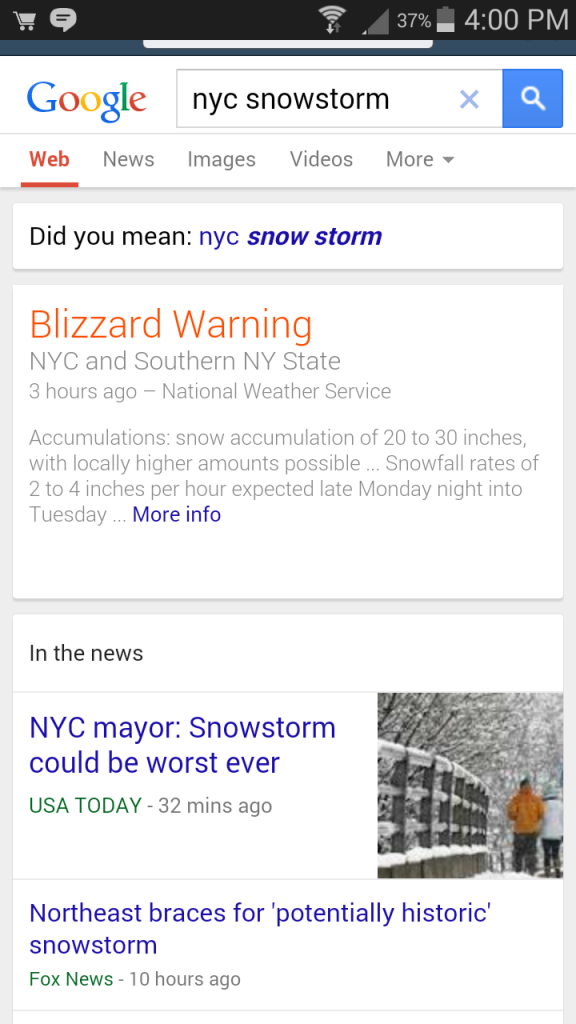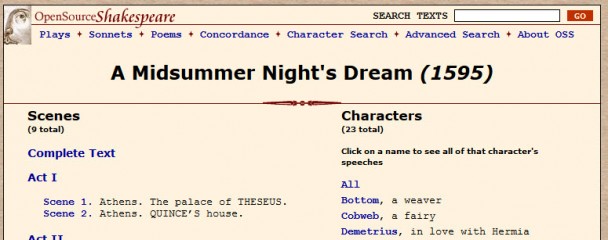Table of Contents
Queries Showing Book Search Results
In my last post here, I wrote about a Google patent that described how Google might return an answer box result for a query involving music. In those searches, the inclusion in the query of the name of a song, and a word such as “lyrics” might cause Google to display song lyrics.
That triggering of content into a display of something in response to a query might not only be happening in the realm of music.
Related Content:
For example, last week when New York City threatened to be buried under a blizzard, an emergency alert in bright red letters was returned to us at Google on a search for [nyc snowstorm].”

An emergency alert answer box showing on Google last Monday in response to warnings from the National Weather Service.
Google has been sending emergency alerts by text to android phone users who agree to accept them. This may have been the first time that Google displayed an emergency alert like this into the results for a search query.
There are some hints that we may see specialized treatments of queries in other places as well, such as in Google’s patents.
Books and Authors Next for Unique Queries?
A patent granted to Google this past November describes how Google might target returning specific types of pages in response to a query aimed at authors or books.
It tells us that on a query for an author, Google might identify books written by that author, and display in search results pages that might include scanned pages of those books. It also notes that when someone searches for a certain book, results might return web pages that can also return scanned pages of that book itself, as book search results.
The patent isn’t necessarily a promise of an answer box result like we were seeing with music queries and song lyrics results. Or even for that blizzard warning in New York City.
But, interestingly, Google is telling us that it would do more than find pages to place in search results that are more than just pages where the keywords from a query are matches for the documents being returned.
And, the patent tells us that if the query isn’t the exact words of a book title or an author’s name, but instead describes a particular subject, “the user may benefit from a list of books from which the user might find useful information for the particular subject.”
So I did some searches to see if my experience was similar to what the patent was describing. When I search for “a midsummer’s night dream” I do get results that include actual copies of the play itself.
The query results are focused upon the book version of the play. And there are at least a couple of results that do include all of the words for the book.
But showing results like that isn’t to be unexpected in a query including an author’s name or the name of a book.
What is more unexpected is that the patent tells us that it will try to include within search results what it calls a “reference page” for a respective book – one that “satisfies a citation criterion for the particular book.”
Like I was saying above, that’s much more than just returning results based upon how often the query terms might show up in a page being ranked, and how much PageRank that page might have. Instead, it’s a promise that the search results will include at least one result that contains specific information about a book or the author of a book.
The patent does tell us that it would likely show such “reference pages” in a “display area separate from the area where other search results are displayed.”
The patent is:
Providing book information in response to queries
Invented by Daniel J. Clancy and Xuefu Wang
Assigned to Google
US Patent 8,880,536
Granted November 4, 2014
Filed: March 1, 2013
Abstract
Methods, systems, and apparatus, including computer program products, are provided for responding to search queries having results that identify books. In one aspect, a search query and multiple web pages that satisfy the search query and have a ranked order as responses to the search query are received.
A subset of web pages that are each a reference page for a respective book is selected. A web page is a reference page for a book when the web page includes a reference to the book and satisfies a citation criterion for the book. A book score is assigned to each of the books for which there is at least one reference page in the group of highest-ranking web pages.
The book scores are used to select one or more of the books. A book reference is generated for each of the books and the book references are provided in response to the search query.
Displaying a Book Reference?
Google does tell us what a book reference might contain in the patent. It could include information such as:
- Title,
- Subtitle,
- Author,
- Publication date,
- Publishing company,
- Number of pages,
- ISBN,
- A brief summary of the contents of the publication,
- A thumbnail image of the cover of the publication, or
- The universal resource locator (URL) of a location at which the reader can read, preview, or purchase the book.
That sounds to me a lot like the information that you might see on an Amazon.com listing for many books. But I’ve seen other publishers/distributors fill their pages with that kind of information as well.
The patent tells us that it might identify several “book reference pages” for the same book, and it might look at a “citation score” to determine which one to feature prominently. That citation score seems to be made up of a combination of information retrieval score, PageRank score, and anchor text score for each page.
The patent does provide even more details on how it might determine the highest ranked page about the book to display prominently, and tells us at the end that this same process might also be used for “other printed publications such as magazines, newspapers, or periodicals.”
Take-aways
This patent points to Google potentially serving specialized results in response to queries about authors and books, that focus upon showing a prominent page that acts as a good reference resource for specific books.
These are not the specialized results that Google returns in response to rich snippets which are triggered by Schema markup on pages appearing in search results.
But they are results that focus upon returning a high-quality response to a query that goes beyond an information retrieval score and a PageRank score, to one that includes a set of reference materials about a book or author that can help to satisfy the information needs of a searcher.
This attempt to focus more upon satisfying what a searcher is looking for when the query seems to be the kind of thing we may see more of at Google.
Search News Straight To Your Inbox
*Required
Join thousands of marketers to get the best search news in under 5 minutes. Get resources, tips and more with The Splash newsletter:
